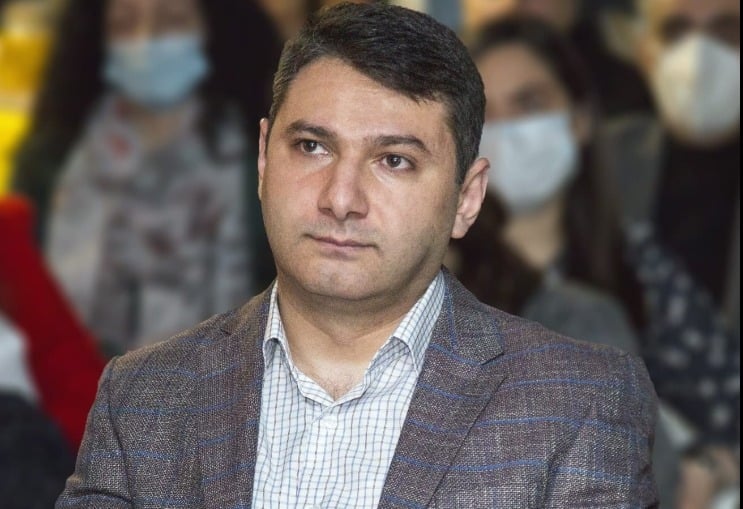In 2021, new economic developments took place in Armenia, although the news of the day was mainly political and security-related.
Director of ACSES analytical center, economist Haykaz Fanyan pointed out various reasons, but one of the main ones was the apparent lack of demand for economic content.
He said that if we can tell an interesting and in-depth story about the economy, people will gradually start consuming such articles. This is the direction of our life, on which our further steps and decisions depend.
For example, in the regions, people need to read publications about the effectiveness of drip irrigation systems, student startup issues, remote and other various employment opportunities, ongoing inflation, bank deposits, exchange rates, and other forecasts.
People may also suffer for the lack of these articles because the economy is accelerating and if you want to be a part of it and succeed, it is important to keep your hand on the pulse.
In 2021, it wasn’t as though economic issues were secondary in the media, they were simply not discussed. Why did it turn out that way?
Due to the circumstances, 2021 was marked by such media events as the internal political crisis, the submission of an ultimatum by the army to the political authorities, the military escalation in Azerbaijan in May and November, the national and large-scale local elections, not to mention the rapid geopolitical developments around our country.
All these were objective reasons that overshadowed the coverage of economic topics.
Besides, there is a lack of journalists specialized in the field.
Economic topics need in-depth coverage, it is necessary to find the language in which difficult-to-digest topics can be made available to citizens without economic knowledge.
There are few thematic media outlets in our country, and the existing ones do not provide wide coverage and have a rather limited audience.
Discussions about new economic models and new opportunities are very important during the post-war and COVID-19 epidemic. Do you think only the political atmosphere overshadows these topics?
To answer this question, I must quote the results of a survey commissioned by the International Republican Institute in July. When asked what should be the priority of the new government, 68% of respondents mentioned security issues and only 10% mentioned economic issues.
This indirectly proves that today the society is focused on non-economic issues, therefore the media demand is the same.
But I would not like to underestimate the interest of the people, it is just that now is a difficult period for our country and security is really a priority.
Economists do not tend to appear much in the media, many of them are closed off from the media. Why do those healthy and constructive relations not exist?
I will find it difficult to give a general answer on behalf of everyone. Unfortunately, most of our media outlets are more engaged in propaganda than the objective coverage of events.
There are many cases when a journalist will take a secondary idea from a 15-minute interview and turn it into an interview headline, which is not the key idea of what you said, but what the media outlet wanted to convey to its audience. They can also calmly edit and not include “undesirable” thoughts.
Sometimes a journalist can contact and ask for a comment on this or that event. For example, on Thursday afternoon, call and ask to get a comment on the Prime Minister’s opinion that was voiced half an hour ago during the government session when you didn’t even follow that session. Usually, in such cases, I refuse to comment.
In 2021, what economic topics were excluded from media attention? Did they skip those topics or did they just not consider them important?
The first thing I remembered was the developments around the Zangezur Copper and Molybdenum Combine. I would not say that they were excluded from media attention, but perhaps the journalists did not have enough knowledge to present the case in depth.
In some economic topics, seemingly small details are important, because they can change the essence of the picture in the future. And there are few specialists who have the ability to notice, analyze and explain them.
The economic content in the local media is very superficial, it is mainly news.
It is difficult to explain the economy in general, there have been and are many seminars for journalists, but the field is not attractive for narrow specialization. Why?
I think the economy is one of the topics that one should be well prepared for before making commentary.
Figuratively speaking, when a journalist asks about economic growth, he should know whether it is about real GDP growth or nominal: as they say all coincidences are random.
As for narrow specialization, I do not agree that covering the economy is not attractive. If I were a journalist, I would try to specialize in economic journalism, because the field is free and if you work hard you can become a famous economic journalist.
Manipulating numbers is easy, how can they be reduced in the media and on social networks? Maybe there is a need for some basic economic knowledge.
When manipulated by professionals, neither media literacy nor basic economic knowledge will save you.
In this regard, the provision of objective and comprehensive coverage by the media is perhaps important. For example, I have not encountered the BBC copying the Facebook status of former British Prime Minister Tony Blair without further comment (edit․ laughs).
But, unfortunately, it is often the media that resort to manipulations, and I have already spoken about the reasons.
As a summary of the conversation, what important economic topics would you suggest journalists cover or conduct investigations in that direction?
There can never be a lack of economic topics, you just have to single out the important ones at that moment. Also to have a sense of smell and to emphasize some topics, to cover, to talk about them with specialists.
That is, to create an agenda of economic topics.
It is very important to focus on several emerging economic topics. For example, the developments related to the Zangezur Copper and Molybdenum Combine, the economic issues of opening the Armenian-Turkish border, inflation, etc.
Interview by Gayane Asryan







